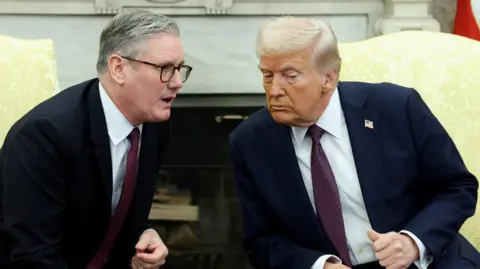The article featuring Chris Mason discusses the complexities surrounding the United Kingdom’s position on Iran amidst rising tensions with the United States and its military actions towards Tehran. The focal point of the discourse is the communication between UK Prime Minister Keir Starmer and US President Donald Trump, particularly following the American airstrikes on Iran. Notably, while the UK government was informed prior to these attacks, it did not actively participate or give approval for engagement with US operations, such as the use of military bases in the Indian Ocean. The situation highlights the careful balancing act that the UK is attempting to maintain in its foreign relations.
With diplomatic rhetoric emphasizing the need for de-escalation, questions have emerged regarding the legitimacy and legality of potential UK involvement alongside the US. Starmer’s government has advocated for a more peaceful approach, fostering dialogue as a means to resolve the ongoing conflict. The British government appeared to be in a precarious situation; agreeing to join military efforts could undermine the efforts made in maintaining constructive relations with the US, while a dissenting vote may lead to diplomatic iciness, particularly after diligent attempts to foster rapport with President Trump.
The article suggests that while the UK’s expressions of support for US objectives regarding Iran—the prevention of a nuclear-armed Iran—are clear, it simultaneously distances itself from the methods, particularly military strikes on Iran’s facilities. Critics within the UK, including members of the Conservative Party, have dismissed this stance as vacillation or “moral cowardice”. This sentiment reflects a growing frustration over the UK’s indecisiveness and the implied necessity for a more assertive position in global affairs.
Amid these developments, Foreign Secretary David Lammy’s meetings with foreign ministers from Europe, including those from France and Germany, aimed to discuss diplomatic pathways forward, but were undermined by President Trump’s dismissive attitude towards these diplomatic overtures. As Lammy continued consultations with his Iranian counterpart, Abbas Araghchi, efforts to promote dialogue were complicated by Iran’s unwillingness to engage while facing assaults from the Israeli military.
The complexity of the situation escalates as the UK appears to advocate for long-term diplomatic solutions but finds its initiatives largely overlooked by the US. As unilateral military actions proceed, these complexities may prompt further discussions at high-level meetings, including an imminent NATO summit involving key leaders, including Starmer and Trump.
The crux of the analysis provided indicates the fragility of international diplomacy, where the UK is projected as a nation advocating for restraint while grappling with the implications of US actions. This delicate diplomatic dance raises questions about the efficacy of transatlantic relations and whether the US will heed the UK’s calls for a more diplomatic approach to the volatile situation with Iran. There remains a lingering uncertainty regarding the direction of UK-Iran relations amid greater US involvement, and the forthcoming discussions among Western leaders could yield new pathways, rival resolutions, or exacerbate existing tensions.
The article underlines that as of now, the UK is persisting in its diplomatic endeavors, even as it grapples with the consequences of American military actions. The evolving narrative suggests a critical juncture as the UK navigates its geopolitical strategies in light of the US’s choices and the regional responses from Iran. With potential ramifications looming, both the UK and its citizens will keenly observe how these dynamics unfold in international realm, especially considering the historical significance and implications of nuclear non-proliferation discussions surrounding Iran.
As discussions continue, speculations linger about whether the forthcoming diplomatic endeavors can foster lasting solutions or simply serve as temporary stasis in a growing conflict that could escalate further with any retaliatory moves from Iran. The stakes are high, and the international community watches closely as this situation develops.



